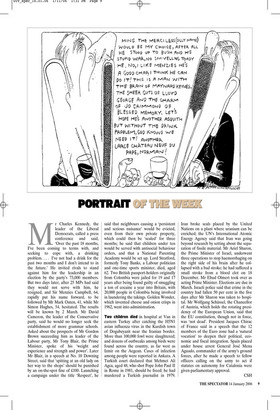PORTRAIT OF THE WEEK M r Charles Kennedy, the leader of
the Liberal Democrats, called a press conference and said, ‘Over the past 18 months, I’ve been coming to terms with, and seeking to cope with, a drinking problem.... I’ve not had a drink for the past two months and I don’t intend to in the future.’ He invited rivals to stand against him for the leadership in an election by the party’s 73,000 members. But two days later, after 25 MPs had said they would not serve with him, he resigned, and Sir Menzies Campbell, 64, rapidly put his name forward, to be followed by Mr Mark Oaten, 41, while Mr Simon Hughes, 54, hesitated. The results will be known by 2 March. Mr David Cameron, the leader of the Conservative party, said he would no longer seek the establishment of more grammar schools. Asked about the prospects of Mr Gordon Brown succeeding him as leader of the Labour party, Mr Tony Blair, the Prime Minister, spoke of his ‘weight and experience and strength and power’. Later Mr Blair, in a speech at No. 10 Downing Street, said that ‘spitting at an old lady on her way to the shops’ should be punished by an on-the-spot fine of £100. Launching a campaign under the title ‘Respect’, he said that neighbours causing a ‘persistent and serious nuisance’ would be evicted, even from their own private property, which could then be ‘sealed’ for three months; he said that children under ten would be served with antisocial behaviour orders, and that a National Parenting Academy would be set up. Lord Stratford, formerly Tony Banks, a Labour politician and one-time sports minister, died, aged 62. Two British passport-holders originally from Colombia were jailed for 19 and 17 years after being found guilty of smuggling a ton of cocaine a year into Britain, with 20,000 people in Colombia being involved in laundering the takings. Golden Wonder, which invented cheese and onion crisps in 1962, went into administration.
Two children died in hospital at Van in eastern Turkey after catching the H5N1 avian influenza virus in the Kurdish town of Dogubeyazit near the Iranian border. More than 100,000 fowl were slaughtered; and dozens of outbreaks among birds were found across the country, as far west as Izmir on the Aegean. Cases of infection among people were reported in Ankara. A Turkish court declared that Mehmet Ali Agca, aged 48, who shot Pope John Paul II in Rome in 1981, should be freed; he had murdered a Turkish journalist in 1979. Iran broke seals placed by the United Nations on a plant where uranium can be enriched; the UN’s International Atomic Energy Agency said that Iran was going beyond research by setting about the separation of fissile material. Mr Ariel Sharon, the Prime Minister of Israel, underwent three operations to stop haemorrhaging on the right side of his brain after he collapsed with a bad stroke; he had suffered a small stroke from a blood clot on 18 December. Mr Ehud Olmert took over as acting Prime Minister. Elections are due in March. Israeli police said that crime in the country had fallen 50 per cent in the five days after Mr Sharon was taken to hospital. Mr Wolfgang Schüssel, the Chancellor of Austria, which holds the rotating presidency of the European Union, said that the EU constitution, though not in force, was ‘not dead’. President Jacques Chirac of France said in a speech that the 12 members of the Euro zone had a ‘natural vocation’ to deepen their political, economic and fiscal integration. Spain placed under house arrest General José Mena Aguado, commander of the army’s ground forces, after he made a speech to fellow officers calling on the army to act if statutes on autonomy for Catalonia were given parliamentary approval.
CSH














































 Previous page
Previous page